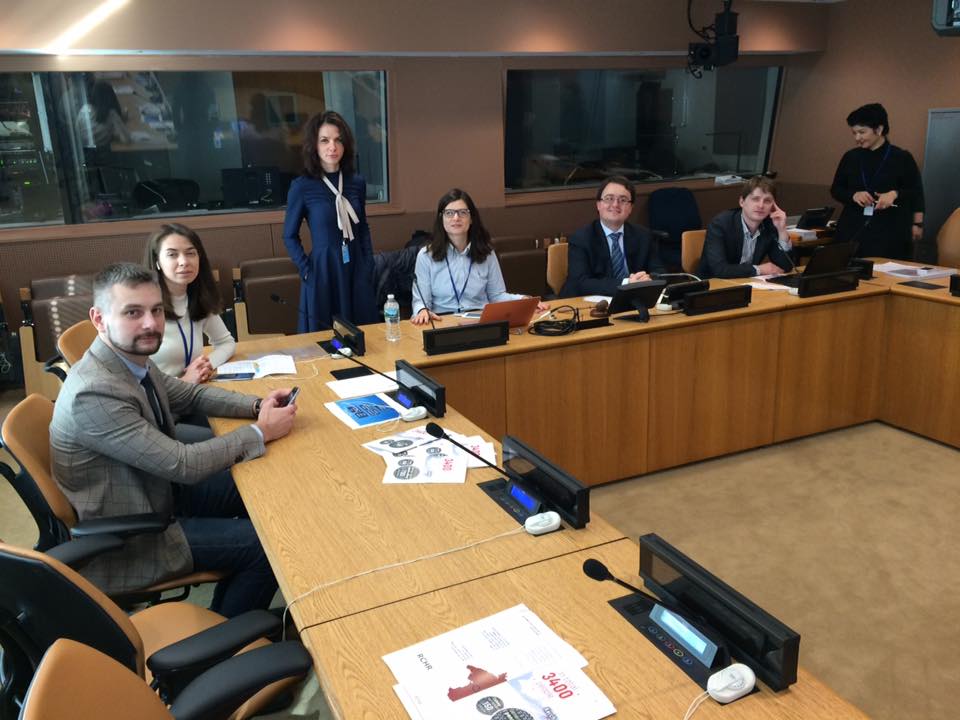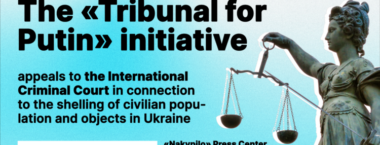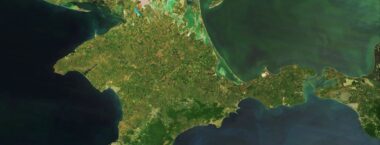On December 11, 2017, a side event with the participation of lawyers of the Ukrainian Helsinki Human Rights Union was held within the framework of the Assembly of States Parties to the International Criminal Court. The purpose of the event was to reveal the role of the International Criminal Court in bringing penetrators of grave crimes committed in Ukraine to justice. The experts presented a petition to the International Criminal Court on the commission of war crimes on the territory of Crimea and eastern Ukraine. Much work has already been done by both civil society organizations and law enforcement agencies, but even more is ahead. But what should be expected from the International Criminal Court in Ukraine?

On February 4, 2015, the Verkhovna Rada of Ukraine issued the second statement recognizing the jurisdiction of the International Criminal Court “… in order to prosecute crimes against humanity stipulated in Articles 7 and 8 of the Rome Statute of the International Criminal Court, war crimes committed on the territory of Ukraine, starting from February 20, 2014 and to date by the highest officials of the Russian Federation and the leaders of the terrorist organizations DPR and LPR, who will be identified by the prosecutor of the International Criminal Court” (note – the full text of the statement is available at the link: http://zakon2.rada.gov.ua/laws/show/en/145-19). This means that the Office of the Prosecutor of the International Criminal Court now has the right to pre-examine the situation in Ukraine in the context of the commission of war crimes and crimes against humanity. But it should be noted that the jurisdiction has a territorial rather than a personal principle. That is, with regard to crimes committed on the territory of Ukraine, and not specific persons – representatives of the Russian Federation.
Currently, in general, the situation in Ukraine at the Prosecutor’s Office is at the stage of preliminary investigation. Regarding the events in eastern Ukraine, two important issues were analyzed: what kind of armed conflict is taking place (the fact of the present armed conflict is not contested already); which exactly crimes were committed in this territory – their nature and scope.
Regarding the nature of the armed conflict in 2016, in the report the Office of the Prosecutor determined that the self-proclaimed L/DPR should be considered as parties to an armed conflict of a non-international nature, while the active actions of the Russian Federation of July 14, 2014, should be regarded as “…the presence of an armed conflict of an international character at the same time…”(note- the text of the 2016 Report is available at the link: https://www.icc-cpi.int/iccdocs/otp/161114-otp-rep-PE-Ukraine.pdf). The 2017 Report further noted that “…the Office of the Prosecutor considers applications regarding the fact that the Russian Federation exercises control over armed groups in eastern Ukraine in order to establish whether an armed conflict that would have been considered non-international may be considered for by its nature as international…”(note – the text of the Report for 2017 is available at the link: https://www.icc-cpi.int/iccdocs/otp/161114-otp-rep-PE-Ukraine.pdf). Therefore, in the future, both civil society organizations and law enforcement agencies should take into account that the Russian Federation exercises general control over the activities of armed groups of self-proclaimed L/DPR if we strive for confirming the existence of an international armed conflict in eastern Ukraine in its pure form.
Regarding the crimes themselves, in 2016, more than 800 incidents of murders, destruction of civilian objects, detention, disappearances, torture, ill-treatment, sexual and gender-based crimes were documented. Already in 2017, it is said about more than 1,200 cases of the same kinds of crimes. Again, the Office of the Prosecutor is considering actions committed not only by illegal armed groups during the conflict, but also by the Ukrainian side. For example, this is stated in the 2017 Report: “…the Ukrainian security services detained in custody without due process of law, both civilians and possible members of armed groups, and forces of the so-called DPR and LPR were freely kept in custody and many cases have been subjected to ill-treatment by civilians suspected of supporting Ukraine as well as servicemen of the Armed Forces of Ukraine…” It can be noted beforehand that the list of both reports is not exclusive to the situation in the East of Ukraine. It is worth taking a closer look at Articles 7 and 8 of the Rome Statute, the list of crimes against humanity and war crimes in order to assess the field for further work with the International Criminal Court. The same can be said about statistical data.
Regarding the documented facts, the Office of the Prosecutor refers to the Office of the United Nations High Commissioner for Human Rights. All data collected by the United Nations Monitoring Mission in Ukraine is periodically published in their reports, where one can look at the documented results of the work and the nature of the violations recorded (note- the text of the latest UN report of the UN Monitoring Mission is available at the link: http://www.ohchr.org/Documents/Countries/UA/UAReport20th_UKR.pdf). In addition, the analysis uses information obtained from government agencies, intergovernmental and non-governmental organizations. Also in the 2017 Report, it was noted that Ukraine’s position in the UN International Court of Justice in the case against the Russian Federation was taken into account in connection with a possible violation of the International Convention for the Suppression of the Financing of Terrorism.
If not going further to the analysis of the very text of the last report of the Office of the Prosecutor, and looking more generally at the process of Ukraine’s relations with the International Criminal Court, it is worth highlighting the main trends. First, at present, information in the Office of the Prosecutor is not enough to open an investigation concerning the situation in Ukraine. Therefore, it is worth to continue working on documenting and transmitting qualitative information about the control of the Russian Federation by the actions of self-proclaimed LPR/DPR and the facts of committing war crimes and crimes against humanity in the East of Ukraine. Secondly, the International Criminal Court adheres to the principle of complementarity in its work. This means that the priority of conducting an investigation is given to the national law enforcement authorities and processes in the national courts. It all depends on the inability and failures of state institutions. Even when the investigation is open, the top executives in the hierarchy of responsible ones will be considered as accused: those who organized, gave orders, were the most brutal in relation to the victims. The middle and lower perpetrators will remain in the focus of national processes, and this should not be forgotten. Thirdly, Ukraine has already stated its intention to ratify the Rome Statute of the International Criminal Court in 2019, but simply ratification for the national system is not enough. It is already necessary to think about ways of its implementation in accordance with national legislation, in particular – to amend the Criminal Code of Ukraine. After all, crimes against humanity are not foreseen by the national legislation of Ukraine, and war crimes are limited to only two general articles with which law enforcement agencies have had to work for the fourth year.
Looking in the future, thinking about conflict resolution and mechanisms for transitional justice (in particular, prosecution), we cannot do half-steps. Ukraine, exhausted by military actions, will not be able to avoid their consequences, and it’s worth understanding and doing everything so that they would not be so painful.
Prepared by Alina Pavliuk (UHHRU)
photo from fb page of Anton Korynevych




